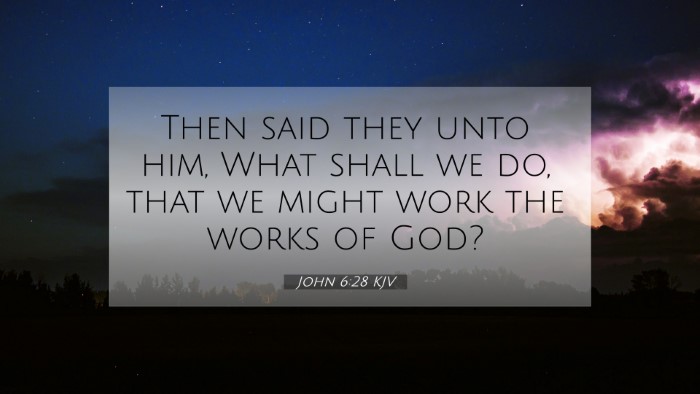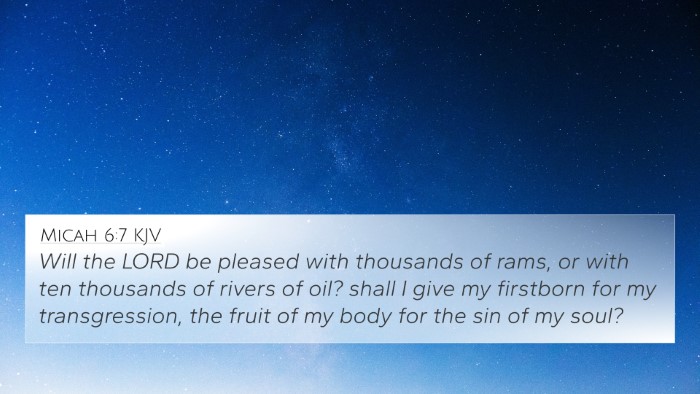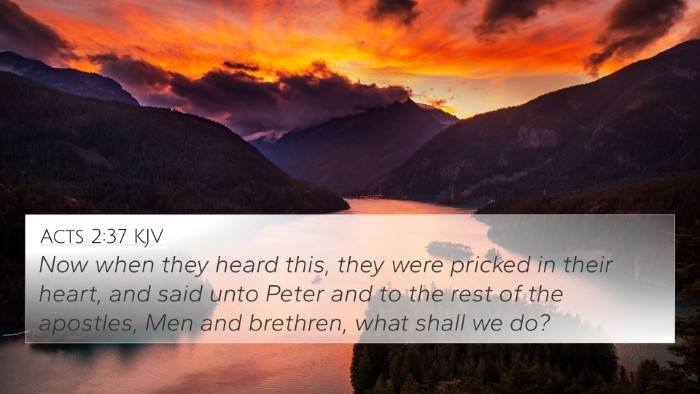Bible Verse Analysis: John 6:28
In John 6:28, the crowd asked Jesus, "What shall we do, that we might work the works of God?" This question underscores a significant quest for understanding the nature of faith and righteous action.
Verse Context
This verse follows the miracle of the feeding of the 5,000 and sets the stage for a deeper discourse about spiritual sustenance. Jesus had just performed a miracle that amazed the people, and they sought Him, not necessarily for spiritual reasons, but for physical bread.
Summary of Meaning
The inquiry of the crowd reveals their desire to engage in religious activity and perform deeds that would please God. It mirrors a common human desire to know the 'works' required for salvation.
- Matthew Henry's Commentary: Henry emphasizes that the question reflects a misunderstanding among the people. They were focused on the physical works rather than seeking the deeper spiritual truths that Jesus was imparting.
- Albert Barnes' Notes: Barnes notes that this inquiry illustrates the general human inclination to pursue religious duties over a relationship with God through faith. He asserts that the works of God are primarily connected with believing in Jesus.
- Adam Clarke's Commentary: Clarke highlights the significance of Jesus' response in the following verses, where He clarifies that the primary work God desires is belief in His Son. This commentary illustrates a clear link between faith and actions in a believer's life.
Connections with Other Bible Verses
This verse relates to several other scriptures, illuminating its themes and doctrines:
- John 6:29: Jesus directly responds to the question by stating that the work of God is to believe in Him whom He has sent.
- Ephesians 2:8-9: This passage elaborates that we are saved by grace through faith, reinforcing the idea that it is not by our works but by belief in Christ that we find salvation.
- Romans 4:5: Here Paul speaks of faith being credited as righteousness, aligning with the notion that faith is paramount over works.
- Titus 3:5: This verse underscores that salvation is not a result of righteous works but through God’s mercy, echoing the theological implications of John 6:28.
- Galatians 2:16: Paul argues that a person is not justified by the works of the law but by faith in Jesus Christ, reinforcing the contrast between works and belief.
- Acts 16:31: The directive to "Believe in the Lord Jesus, and you will be saved" succinctly encapsulates the essence of what Jesus meant in John 6:28.
- James 2:19: While faith is essential, James stresses that faith should be evident through works, hinting at a balance between faith and action.
Thematic Connections
The themes arising from John 6:28 can be explored through a cross-referencing approach:
- Faith vs. Works: How does John 6:28 contrast with the religious practices of the time? This invites comparative analysis with James 2 and Galatians 5.
- Bread of Life Discourse: John 6 continues with the theme of Jesus as the Bread of Life, linking it to the Sermon on the Mount where Jesus teaches about spiritual bread (Matthew 5).
- Trust in God: The overarching connection to trusting God for provision appears in themes drawn from Psalms, notably Psalm 37:5.
Tools for Bible Cross-Referencing
Engagement with the Scriptures requires effective tools for Bible cross-referencing. Here are some recommended methods and resources:
- Bible Concordance: A concordance can help identify and link related verses.
- Bible Cross-Reference Guide: Utilize guides that compile related scriptures for easier study.
- Cross-Reference Systems: Many study Bibles include built-in cross-references for in-depth exploration.
- Bible Reference Resources: Online databases and printed resources provide comprehensive referencing materials for deeper study.
Conclusion
John 6:28 serves as a foundational verse prompting believers to move beyond the mere pursuit of religious works and towards a heartfelt belief in Jesus Christ. It encourages a deeper understanding of faith as the essential work of God. Through comparative Bible verse analysis, thematic connections, and effective cross-referencing tools, individuals can uncover the profound truths embedded in Scripture.
This exploration also invites further study on how different verses relate to one another, facilitating an inter-biblical dialogue that enriches our understanding of the Word. Engaging with tools for Bible cross-referencing can significantly enhance one’s study and application of biblical truths.











